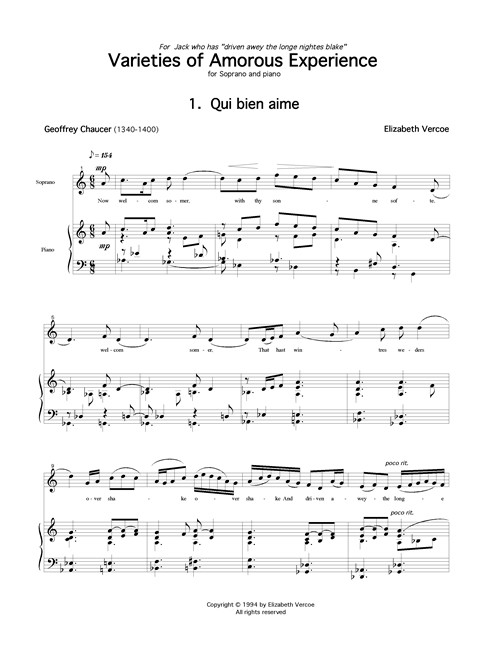Varieties of Amorous Experience
for mezzo or soprano & piano (1994)
American Composers Alliance, 10 minutes
” Her unique combination of high intellect and musical spontaneity sets her apart in her vocal offerings. This time she gives both singer and pianist a finely woven texture of color and melodic intricacies” (The NATS Journal)
The Varieties of Amorous Experience sets one joyful, one serious and two hilarious English poems to music. The opening song, “Qui bien aime a tard oublie,” is a celebration of summer and love on a text by Geoffrey Chaucer. The second song, “An Appeal to Cats in the Business of Love,” by Thomas Flatman (1637-1688) is a far more gimlet-eyed view of love. Shakespeare’s exquisite sonnet, “How Like a Winter” speaks of love in the context of the seasons. The final song, “The Kiss,” by Coventry Patmore (1823-1896) is yet another variety of amorous experience, this one coy, flirtatious in the extreme, and arch in its humor.
Varieties was premiered by soprano Kathryn Wright accompanied by Jack Jarrett on a festival of new music at Wellesley College. The piece has also been performed at Caldwell College in New Jersey, at the Women in Music Conference at Ohio University in 1997, in Santa Fe, New Mexico, and at Austin Peay State University in Tennessee.
Texts:
Varieties of Amorous Experience
1. Qui Bien Aime
Geoffrey Chaucer (1340-1400)
Now welcom somer, with thy sonne softe,
That hast wintres weders over-shake,
And driven awey the longe nightes blake!
!
Seynt Valentyn, that art ful hy on lofte,
Thus singen smale foules for thy sake
‘Now welcom somer, with thy sonne softe,
That hast this wintres weders over-shake.’
Wel han they cause for to gladen ofte,
Sith ech of hem recovered hath his make;
Ful blisful may they singen whan they wake;
‘Now welcom somer, with thy sonne softe,
That hast this wintres weders over-shake,
And driven awey the longe nightes blake.’
2. An Appeal to Cats in the Business of Love
Coventry Patmore (1823-1896)
Ye cats that at midnighte spit love at each other,
Who best feel the pangs of a passionate lover.
I appeal to your scratches and your tattered fur,
If the business of Love be no more than to purr.
Old Lady Gimalkin with her gooseberry eyes,
Knew something when a kitten, for why she is wise;
You find by experiences, the love-fit’s soon o’er.
Puss! Puss! lasts not long, but turns to Cat-whore!
3. How Like A Winter
William Shakespeare (1564-1616)
How like a winter hath my absence beene
From thee, the pleasure of the fleeting yeare!
What freezings have I felt, what darke daies seene!
What old December’s barenesse every where!
And yet this time remov’d was sommer’s time,
The teeming autumne big with ritch increase,
Bearing the wanton burthen of the prime,
Like widdowed wombs after their Lord’s decease:
Yet this aboundant issue seem’d to me,
But hope of Orphans, and un-fathered fruite,
For sommer and his pleasures waite on thee,
And thou away, the very birds are mute.
Or if they sing, tis with so dull a cheere,
That leaves looke pale, dreading the winter’s neere.
4. The Kiss
Thomas Flatman (1637-1688)
‘I saw you take his kiss!’ ”Tis true.”
‘O, modesty!’ ”Twas strictly kept:
He thought me asleep; at least I knew
He thought I thought he thought I slept.”

